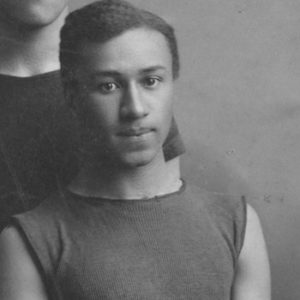
George C. Poage
*George Coleman Poage was born on this date in 1880. He was a Black athlete and teacher.
In 1884, his family moved from Hannibal, Missouri, to La Crosse, Wisconsin. Young George Poage was both a good student and a good athlete. He graduated second in his high school class of 25 students in 1899 and presented the salutatorian's address. "None went on to become notable in other than a local sense," the newsletter said, "except for Poage." It was his speed that got him noticed. He had run in high school in one meet, winning the 50, 100, and 220-yard dashes before removing his shoes to win second place in the standing broad jump. After high school, he moved to Madison to attend the University of Wisconsin.
The Olympic games of 1904 were far smaller than they would become. Only 496 athletes from 11 countries competed, and just 20,000 spectators were in attendance for track and field events. Many Americans wore the uniforms of competing athletic clubs that dominated the games. Poage was running for the Milwaukee Athletic Club; he was its first non-white competitor when he won bronze medals for finishing third in the 200-meter and 400-meter hurdles.
His groundbreaking performance was remarked upon and, for a time, remembered. In 1913, a La Crosse newspaper would describe Poage as "one of the fastest men in (the) world" at the time and as "perhaps the greatest track athlete that was ever developed in this city." Still, in keeping with the times, even his hometown's pride was less than colorblind. "Poage Runs Third In Olympian Games," the La Crosse Leader-Press reported on Sept. 1, 1904. "La Crosse Colored Athlete Tired Near Finish."
Following his short career as a runner, Poage moved to St. Louis to become a teacher at Charles Sumner High School. Spending just under ten years there in 1914, he purchased a farm in Minnesota. By 1920, he relocated to Chicago. He encountered few opportunities as a black man despite his athletic and academic successes, and after a series of jobs, he eventually found steady work as a postal clerk. Poage worked for the U.S. Post Office for nearly 30 years before retiring in 1950.
George Coleman Poage spent the remainder of his life in Chicago until he passed at 82 on April 11, 1962.